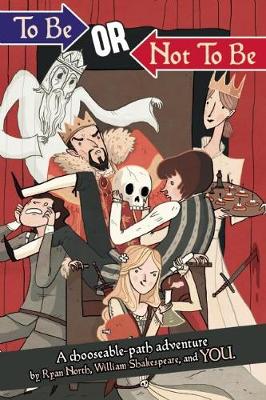Reviewed by Briana @ Pages Unbound on
To Be or Not To Be is not one of those sad choose-your-own-adventures where you frustratingly die no matter what you do, or where your story ends after two minutes. Dying is still a possibility, but so are awesome things like becoming the monarch, having a happy life, or having a mediocre life. Some storylines offer sweet surprises, like momentarily getting to be a different character, and most of the storylines are a satisfying length. The options are also good ones. There is no making simple decisions about whether you are going to walk left or right when you go to take a stroll about the palace; instead, most of the options make you feel as if you can actually put some thought into what you’re going to do and have some real agency over where your story goes.
There is some “leading.” The author has a particular brand of humor (and it imbues enough of the book that I can imagine readers who dislike this brand of humor will quickly become frustrated with the book), and he occasionally offers commentary on whether he thinks you are going to make a silly decision or whether he thinks Shakespeare’s characters made silly decisions. This is an author who has a lot to say if you play Ophelia as a meek young woman submitting to her father and brother’s commands. However, the commentary does not feel overly pushy. I can’t imagine someone not picking an option just because the author poked fun at it a bit. In fact, it might inspire some people to pick that option anyway.
In addition to providing pervasive commentary on whether North thinks Shakespeare’s characters are logical or progressive or whatever, North also throws some attention to the original Hamlet by marking with a little skull the actions that Shakespeare’s characters would have taken. So readers can interact with the play how it generally unfolds in Shakespeare’s world, or they can “rewrite” the play by taking new actions. North also gives a clever nod to the play-within-the-play by including a book-within-his-book. This is a mini choose-your-own-adventure, though as far as I can tell there aren’t too many paths to take in order to get to it.
Overall, To Be or Not To Be is both entertaining and education. I imagine someone would have to already be familiar with Hamlet to really “get” it—to enjoy the allusions, in-jokes, etc., but it functions well enough as a choose-your-own-adventure and gives enough clues as to what happens in Shakespeare’s Hamlet that familiarity doesn’t seem strictly necessary. Recommended for both Shakespeare fans and people who are sick of dying in choose-your-own-adventures.
Reading updates
- Started reading
- 14 January, 2015: Finished reading
- 14 January, 2015: Reviewed
